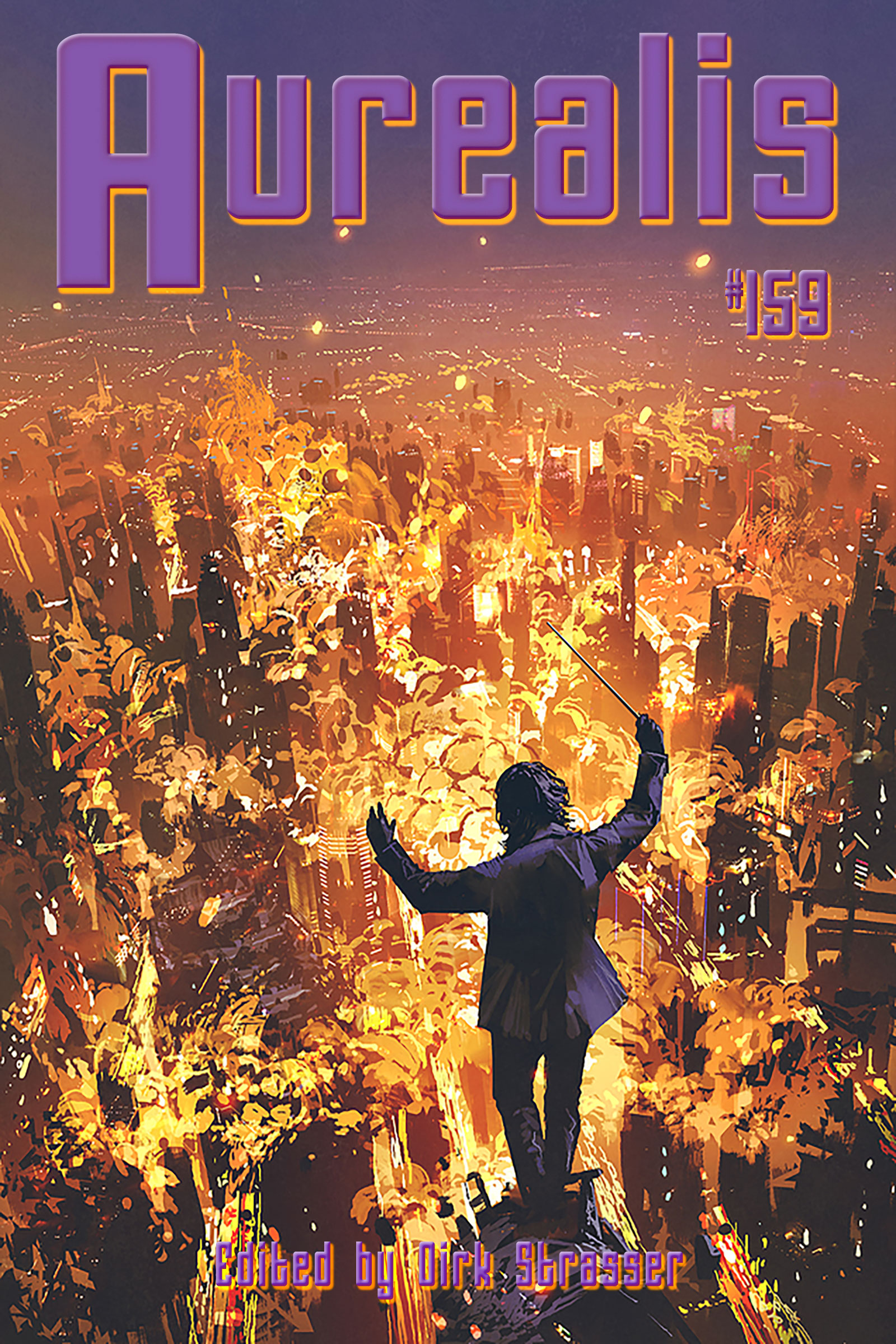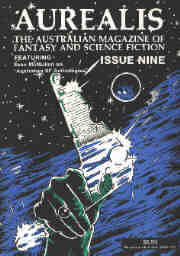Aurealis #159
$3.99
In this issue, Amy Dawn Buchan’s ‘A Dead World Wakens’ has a unique take on a post-apocalyptic Earth, combining alien colonisation and the ethics of reviving an extinct species. J R Dunbar’s ‘The Bridge from the City Midst’ is a thoughtful tale of the loss of faith, life, and purpose. John W M Thompson’s ‘Are you Shivering?’ is an ominous story with a sympathetic depiction of mental illness.
- From the Cloud — Dirk Strasser
- A Dead World Wakens — Amy Dawn Buchan
- The Bridge from the City Midst — J R Dunbar
- Are you Shivering? — John W M Thompson
- Holy Forking Shirtballs! Revisiting The Good Place Five Years on — Stuart Olver
- Everything for Everyone: A Utopian Novel Without Illusions — Ani White
- The Continuing Longevity of Speculative Fiction Spinoffs — Claire Fitzpatrick
Does the wave of AIs with natural language capabilities herald the end of fiction? If you think that the question is absurd, you haven’t really got to grips with the sorts of things that ChatGPT and other generative software can do.
The American SF magazine Clarkesworld has the following message on its website:
Statement on the Use of ‘AI’ writing tools such as ChatGPT
We will not consider any submissions written, developed, or assisted by these tools. Attempting to submit these works may result in being banned from submitting works in the future.
Editor Neil Clark announced in February they were temporarily closed to submissions because of the sudden 38% increase in what they called ‘AI spam’ submissions. He says he can spot them because there are some obvious patterns. Sheila William said Asimov’s experienced a similar increase. She says, ‘The people doing this by and large don’t have any real concept of how to tell a story, and neither do any kind of AI. You don’t have to finish the first sentence to know it’s not going to be a readable story.’
We at Aurealis haven’t experienced the same increase, but we only have a small window this year when we are open to submissions outside of Australia and New Zealand, so we could be shielded from the full impact. We have had one Reader commenting that a few of the recent submissions just felt a little ‘off’, but they couldn’t put their finger on why. Others have said they don’t think anything AI-generated would get through our reading process, but there hasn’t been any indication that something is clearly AI-generated, so far.
Here are some questions to think about with my stab at the answers based on my current understanding:
Who owns the copyright of AI-generated fiction?
Well, either no-one or the humans who wrote the material that the AI was trained on. The words aren’t actually copied from anywhere. The AI generates words that it has statistically predicted from the web as a response to an instruction and rephrases the material. The words have never been put together in exactly that combination before.
Who can pretend they have actually written a work of fiction that was generated by an AI?
Er… anyone can. Maybe at this still relatively early stage of these AIs, you can tell (or think you can tell) that the work wasn’t written by a human, but you could never be absolutely certain. (And the AIs will only get better.) Ironically, one criterion you could use is to see if the work has no grammatical errors or incorrect word usage—but, of course, that could also be a sign of a highly competent writer. Plagiarism-checking software has been around for some time, so some sort of AI-identifying software is possible, but will it be good enough to keep pace with improvement in AIs?
Can AI-generated fiction be truly original?
Science fiction writer Ted Chiang sees a human author’s first draft as often an original idea, badly expressed, while the best an AI can generate is a competently expressed, unoriginal idea. One way to look at what the AI does is create an amalgam of photocopies of original documents. Originality is always lost through the photocopying process. On the other hand, there are also lots of unoriginal human fiction authors around. Being truly original is a high bar that few writers achieve. And yet, each human’s life is unique, so the perspective they bring to a work of fiction has originality as its seed. The best writing comes from skilled writers who can turn that unique perspective into fiction. An AI can’t do that.
Can AI generate fiction that ignites an emotional response in the reader?
Authors create emotional responses through combinations of words. If you ask an AI to write a horror story, I suspect it can glean how to achieve the fear effect with all the sources available to it. Can it create fiction that makes the reader laugh? Maybe, puns can be generated, jokes have structure, certain situations are inherently funny. What about making them cry? Who knows? I’m sure someone will put that to the test. Can an AI generate the sense of awe that a great work of science fiction or fantasy can? I suspect not, but then I’m biased. The most powerful emotional response to a work of fiction, however, goes deeper than fear, humour, sadness or awe—it’s the sense of human connection that the reader feels with the words spun by the writer. An AI can’t do that.
How much instruction would a writer need to give an AI for it to generate a publishable work of fiction?
Minimal instructions will most likely result in a bland, uninteresting work that wouldn’t make it to publication. However, if you are a meticulous planner, then including detailed plot outlines, world build and character descriptions could result in something publishable. The garbage in garbage out rule applies. The success or otherwise depends on the quality of the input. As every planner knows, there is an enormous amount of time and effort needed before the writing begins, so the success or otherwise will depend on all that work. If you are more of a pantster (and fly by the seat of you pants), then the joy of the writing is in the discovery, so you probably wouldn’t see any point in using AI to write fiction. Either way, the AI may end up being of some assistance to some fiction writers, but it can’t replace them.
What are fiction writers feeling about the potential impact of AIs?
They’re not happy. I’ll give just one quote. This is from British-Australian dark fantasy author, Alan Baxter: ‘In a world where people are still cleaning toilets and working in mines, I can’t believe we’ve got the robots making our art and stories. I thought robots were supposed to do the shitty jobs to allow more people to pursue their passions. AI is simply a hideous and well-focused encapsulation of capitalism at the expense of humanity.’
What’s the most optimistic outcome of AIs for fiction writers?
AIs could end up being support for fiction writers rather than making their life harder. At some point it will be possible to feed an AI your novel manuscript and ask it to generate a synopsis of your novel to a set word count, taking on a burden that many writers loathe. If it could, for example, provide a narrative description of a particular place at a particular time in history, it would short-circuit a considerable amount googling and other research. The AI could also provide some required technical information in natural language specifically catering to non-specialist readers that can be adapted for a work.
We live in interesting times.
All the best from the cloud!
Dirk Strasser
From A Dead World Wakens by Amy Dawn Buchan:
I am called Tor’qlir, named for the crimson colour I bleed, in the language of my kin.
I was named this on the day I awoke, blinded not by the searing radiation of the sun (as is the way of my people,) but instead by white lights as brilliant as they were blinding. Not breathing in the damp coastal breeze, as the Work dictated for newborns, but indoors, in the sterile stillness of filtered air.
From The Bridge from the City Midst by J R Dunbar:
I was nineteen when I came to terms with death.
The diagnosis was swift, following the incident. My parents sat either side of me in the waiting room. Mum let her tears flow freely, while Dad remained a rigid sculpture. Each held one of my hands. When they let go and the doctor clasped them instead, it felt like cradling a soft toy.
From Are you Shivering? by John W M Thompson:
“I thought close encounters were supposed to be sublime,” Joshua had said, with a little laugh. He thought they were UFOs. “Sublime like frightening, but also wonderful, you know? A white light, that’s at least inviting. This I don’t know what to do with.”
From Holy Forking Shirtballs! Revisiting The Good Place Five Years on by Stuart Olver:
The creators of Netflix’s hit show The Good Place (2016-2020) want you to know that everything is going to be fine.
From Everything for Everyone: A Utopian Novel Without Illusions by Ani White:
Everything for Everyone: An Oral History of the New York Commune, 2052–2072 (2022) is a utopian account of a future communist society (up-front clarification: this is small-c communism, a classless stateless society, rather than state-led Big-C Communism).
From The Continuing Longevity of Speculative Fiction Spinoffs by Claire Fitzpatrick:
Speculative fiction shows have been around in one form or another since the early days of television. The first regular sci-fi serial, Captain Video and His Video Rangers (1949-55) captivated audiences with the adventures and exploits of Captain Video, an inventor and ‘Master of Science’.




